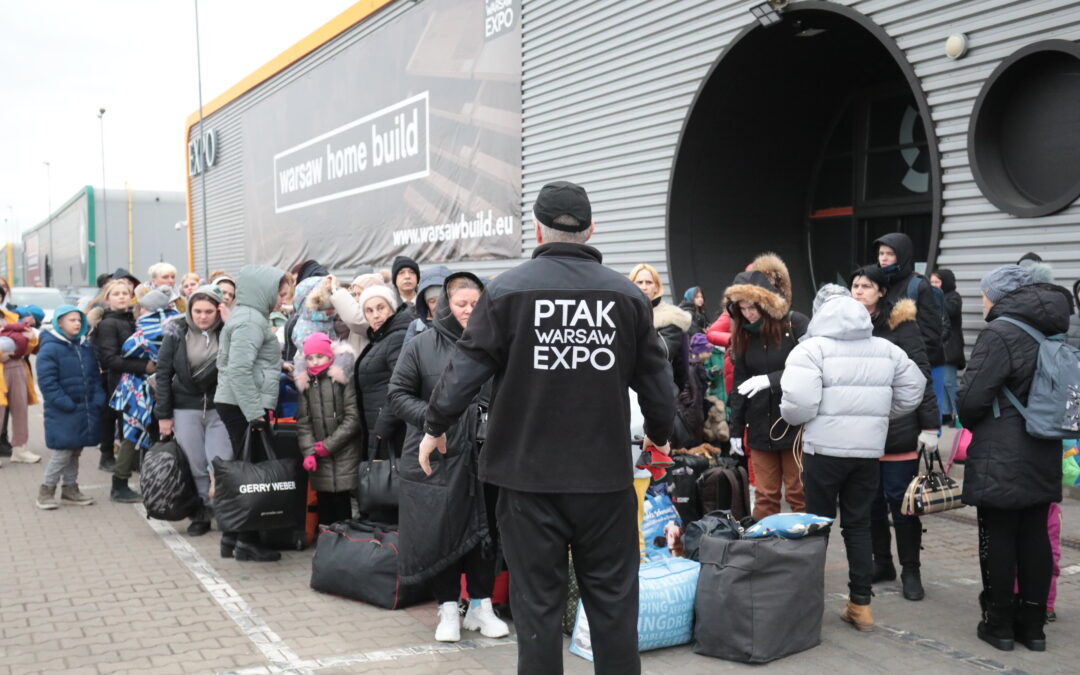The city of Warsaw has spent 55 million zloty (€11.8 million) on helping refugees from Ukraine in the seven weeks since Russia’s invasion, its mayor has revealed. He renewed calls for more financial support from the Polish government.
Poland has been the main destination for those fleeing Ukraine, with 2.7 million people crossing its border since the start of the war. Most have subsequently headed for the largest cities, including the capital, which has seen its population rise 17% with the arrival of around 300,000 refugees.
“Since the outbreak of the war, Warsaw has spent 55 million zloty to help refugees,” said mayor Rafał Trzaskowski, quoted by Dziennik Gazeta Prawna. “We are drawing, of course, from the reserves.”
He added that the city, acting as an intermediary to the government, has spent an additional 22 million zloty (€4.7 million) on benefit payments but has so far received less than 8 million zloty (€1.7 million) to help cover the costs, reports Interia.
Local governments bear the cost of a one-off payment of 300 zloty per person to be paid to Ukrainian refugees, payments of 40 zloty per day to individuals and organisations that provide accommodation to Ukrainian refugees, and issuing personal identification (PESEL) numbers.
Trzaskowski said the city also has to pay two million zloty (€431,000) for a three-month lease to the company that manages the National Stadium, where thousands of Ukrainians have queued as they wait to register for their Polish ID numbers.
There continue to be long queues outside public offices issuing Ukrainian refugees with Polish ID (PESEL) numbers under a newly introduced system
Warsaw has set up a special point at the National Stadium (pictured below) that is operating over the weekend https://t.co/ppkclfRTp9
— Notes from Poland 🇵🇱 (@notesfrompoland) March 20, 2022
Refugees have accessed health services 10,000 times in the capital so far, added the mayor. He also noted that 120,000 out of the 300,000 refugees currently in Warsaw are children. If only 40,000 children of preschool age join local kindergartens, the costs for the city would amount to two billion zloty.
“It would mean creating 800 new kindergarten groups, employing 2,000 carers and preparing 150 kindergarten buildings,” he said, noting that while local authorities will receive a larger education subsidy, it might not be enough to cover the total cost. “One preschooler costs 1,300 zloty per month, and the government offered 380 zloty.”
“In the meantime, we haven’t received a single zloty for education,” said Trzaskowski, quoted by Interia. “We might have a second wave of refugees any minute. If some of them come to us, we will have a problem. Without a system for refugees, it will fall apart like a house of cards.”
Trzaskowski, a member of the largest opposition party, Civic Platform (PO), has repeatedly accused the government of failing to provide enough support, saying that much of the weight of helping refugees has fallen on local authorities, NGOs and individuals.
Other large cities have also called for greater help from the national authorities, and also appealed to the government to secure international funds for Poland. Kraków – whose population has grown by around 20% due to refugees – recently received a promise of financial support from the UN refugee agency.
Nevertheless, a poll this week showed that two thirds of people in Poland – including half of opposition supporters – positively assess the government’s actions on the international stage during the war in Ukraine.
Main image credit: Slawomir Kaminski / Agencja Wyborcza.pl

Alicja Ptak is deputy editor-in-chief of Notes from Poland and a multimedia journalist. She has written for Clean Energy Wire and The Times, and she hosts her own podcast, The Warsaw Wire, on Poland’s economy and energy sector. She previously worked for Reuters.




















